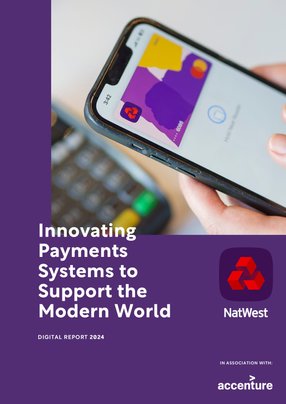Every day in the UK, 20%+ of domestic payments volumes are processed by NatWest. As one of the country’s top high street banks, it is the beating heart for personal and business customers from all walks of life.
NatWest was formed in 1968 as a result of the merger of National Provincial Bank and Westminster Bank. In 2000, it became part of The Royal Bank of Scotland Group, which was rebranded as NatWest Group in 2020. Natwest is one of the Big Four clearing banks in the UK, with more than 19 million personal customers and 1.3 million Commercial & Institutional and Wealth customers.
Despite covering so much ground, there is one key theme that binds everything together: the technology that facilitates it all.
“It's pretty impressive and scary at the same time that we process 20%+ of domestic payments volumes ,” shares John Pillar, Distinguished Engineer and Head of Payments Engineering & Environments at NatWest.
Technology advancements in the ever-changing financial sector
Since John joined NatWest and the fintech sector in 2018, he has had a front row seat to almost-unfathomable change. NatWest’s ambition and culture has been maintained, but its focus on keeping up with technology in an industry where change happens at an exponential rate is no mean feat.
As with companies across all sectors, a key focus has been — and will continue to be — sustainability, with NatWest supporting COP26 in Glasgow, Scotland as a principal partner.
“Sustainability is a really good example of how NatWest has changed,” John explains. “From my team's perspective, there is an emphasis on making sure we create and code solutions in a sustainable way. We have to provide seamless services to our customers, but equally there's a real duty to the wider planet that we all strongly believe in. Our talent is not just looking at solving the problem, but making sure it's also the most sustainable way that helps keep costs under control as well as a by-product.”
Within NatWest, technology infrastructure supports payment services, which assists its customers with anything from buying a coffee to buying a house.
“You need the technology to work because, if it doesn't, you could feel embarrassed — which is weird because it’s not with the customers themselves where something's gone wrong,” John explains. “There’s always an expectation that a seamless payment will happen, and that’s what we work to ensure.
“Our company mission is about being there for the customer through their life, but, equally, really helping them with their potential — whether it be a person, a family or a business, helping them thrive in whatever their challenge is.
“Our Group CIO’s strategy is ‘engineer, operate and protect’. I think those are three fantastic words that allow our teams to galvanise around the work we need to do.”
This includes hiring and retaining talent and pushing industry standards, ensuring technology works seamlessly and issues are fixed before presenting issues to the customer, and leveraging technology to ensure customer credentials are safeguarded from criminals.
Being there for the customer every step of the way
Technology infrastructure is vital in supporting payments services, which is considered critical national infrastructure both within NatWest and as part of the wider economy. Because of this, the vast majority of NatWest’s services must be available 24/7 and, as a result, must be highly resilient.
To maintain this, and because technology has adapted at such a pace in recent years, John and his team have had to leverage and migrate some of its systems into that world of public cloud.
“Equally, we are making sure that, where platforms cannot take advantage of those types of technologies, we’re leveraging the same principles that you have in public cloud and applying them to our existing infrastructure,” he adds. “So, where we have our own data centres, we’re making sure we can recreate environments instantly the same as what we’d do with some of the new cloud technologies as well.
“It's that very niche dark art of trying to do new things without any impact. Like riding a bike and changing the front wheel without stopping.”
In a bid to accelerate NatWest’s technology transformation, John emphasises that the main goal is working out which is the right and best application of technology to solve problems. And some of those technologies are more commonplace than many may realise. Hot topics like generative AI and Machine Learning (ML), for example, are among the technologies that support John and his team in their payments work.
Gen AI and ML can provide supporting staff with prompts and even solve repetitive challenges before engaging a human to manually process an action.
And it doesn’t stop there. John and NatWest are exploring how emerging technologies can aid with the schemes and regulatory obligations involved within the payments industry.
“We are leveraging ML to understand what these changes are and apply that to some of our systems and give us a summary of what we need to do,” he shares. “For example, the Prudential Regulation Authority (PRA) regulator may be suggesting we do ‘this’, but how does that really translate through to some of our systems? It also means we don't have to read extensively a 700-page document, for example. The ML can give us an appraisal of what it is and then we can actually put our experts and expertise into the areas that need it.”
Protecting customers’ intimate and personal data
It’s unsurprising that a core element of John’s role is security, with his team members doing everything in their power to ensure customers’ accounts are not compromised. That’s why NatWest employs a cohort of ethical hackers who constantly explore its technology systems to identify weaknesses that could be exploited in the wrong hands. By doing this, a system and even third-party’s security, safety and resilience is better ensured, and it enables NatWest to keep ahead of emerging malicious actions.
“Everybody understands the role of security,” John begins, “and it's so easy to get an email from a provider where you just click on a link and give over your details. So, for us, it’s also about how we correspond with our customers as we need to be very mindful of trust. Customers may question whether it’s really us that's trying to reach out or another scam that's going around. We’re unable to do so unless we have that awareness internally about how these things are evolving.”
“It’s a constant battle, which is why we have these ethical hackers inside our organisation that can help us and inform us about new trends that are happening.”
Enriching NatWest’s depth and breadth of expertise
Whether protecting a customer's personal data or facilitating banking on the go, technology underpins NatWest’s modern-day operations. But for John, who spent a large portion of his career in retail, a key focus is ensuring it goes beyond security, enabling an enhanced and competitive experience for the customer and making its services easy to use.
“Although we have purely digital channels — so, ensuring we have the best mobile experience — I think the same applies to the branch network and the physical pieces,” John explains. “It caters for the entire array of normal uses, but also supports people with disabilities, whether it be dyslexia or they need different kinds of interaction without a keyboard.
To ensure the best experience, NatWest leverages the expertise not only within its own organisation, but that of its partners. The company is firm in its belief that it cannot be an expert across all areas, and forms partnerships with other businesses across a variety of its operations — including payments — to ensure it has the broadest knowledge base possible for the benefit of its clientele. Partners include a variety of vendors, third parties and consultancy firms, allowing NatWest to have a better-rounded, holistic view of the industry.
For example, public perception of cash changed dramatically in light of the COVID-19 pandemic and made many reluctant to use physical currency due to associated health concerns.
John explains: “There's nothing wrong with physical cash, but having our partners there helps us understand consumer trends and figure out what types of potential new services and products we want to create, build and offer.”
This sentiment extends as NatWest continues its re-platforming and transformation from a technology perspective, also allowing people to upskill, cross-train and power top talent. When NatWest itself does not have capacity for certain projects, leveraging vendors and suppliers helps keep things on track and avoids customer disappointment, all while making the most of their expertise and skill set.
Specifically, NatWest has a long-standing partnership with Accenture which sees the bank harness the IT and consulting company’s network and expertise. For John, from a leadership perspective, this means opening up conversations around industry trends and gaining insights into what other organisations and sectors are striving to achieve.
“They help us with their global perspective around what's happening — because how you approach payments in India is actually quite different to how the US and UK approach payment systems, for example — so they're able to have really great valuable conversations around that,” he shares.
As well as this, NatWest has worked with Accenture teams on a new proposition creation to help children have a better experience around saving, providing education around things like ISAs.
“Partnerships are not like outsourcing; it doesn’t mean we let people go,” John emphasises. “Our partners have really great expertise, and we can’t know everything. They are also that soundboard where they consult industry experience. It’s a really good way of challenging us as well.
“Without them, we wouldn’t be able to operate at the scale we do or keep pace. Customer habits are changing, so being able to leverage our valuable partners — whether through some of the transformation we're doing, the innovation side of things or to remediate some of the legacy that we have — helps us stay in control.”
The future of technology in financial services
Across the industry, John is seeing a seismic shift driven by the desire to have more rich data available. Having that data, or that of third parties, enables more comprehensive financial crime monitoring and enhances all of NatWest and the wider financial services sectors. Despite it taking time to roll out more widely, John expects momentum in this space to grow and create new, innovative areas that are currently incomprehensible.
In addition, more instant payments are on the horizon, says John. He explains: “Some people might have an account where they save, or a current account where they pay their credit card off, but it's not instant, right? You've got to wait a day or even a couple of days and then that transaction happens.”
“Unfortunately, or fortunately, as a society where things are a lot more instant, we want and necessarily demand some of that from the different services we get. And banking and payments is no exception to that.”
Whether it be the push for more instant payments services, improving customer experience or continuing to be the defence protecting customers from threats, the future remains uncertain. But if one thing’s for sure, NatWest will be there for its customers with innovative technology solutions every step of the way.
**************
Make sure you check out the latest edition of FinTech Magazine and also sign up to our global conference series – FinTech LIVE 2024.
**************
FinTech Magazine is a BizClik brand.



